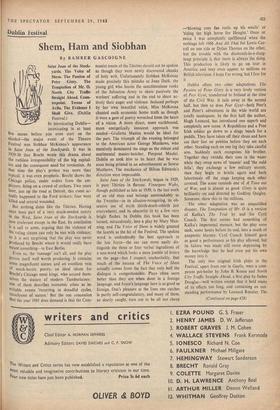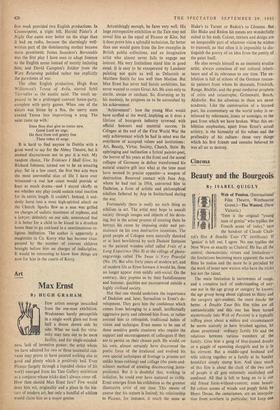Dublin Festival
Shem, Ham and Siobhan
By BAMBER GASCOIGNE Saint Joan of the Stock- yards. The Voice of Shem. The Passion of Peter Ginty. The Temptation of Mr. 0. North City Traffic Straight Ahead. Coun- terpoint. Teresa of Avila. The Evidence I Shall Give. (Dublin Festival.) IN intoxicating Dublin— intoxicating in at least five senses before you even start on the alcohol—the major event of the Theatre Festival was Siobhan McKenna's appearance in Saint Joan of the Stockyards. It was in 1929-30 that Brecht wrote this drama about the ruthless irresponsibility of the big capital- ists and the consequent need for revolution. At that time the play's protest was more than topical; it was even prophetic. Brecht shows the Chicago police, under orders from the em- Moyers, firing on a crowd of strikers. Two years later, just up the road at Detroit, this event ac- tually happened to the Ford strikers; four were killed and several wounded.
But nothing dates like the Thirties. Having °nee been part of a very much-needed outcry In the West, Saint Joan of the Stockyards is n. ow irrelevant except in the East. Its conclusion 15 a call to arms, arguing that the violence of the ruling classes can only be met with violence; so it is not surprising that the play was never Produced by Brecht where it would really have meant something—in East Berlin.
Even so, the 'message' isn't all, and the play Proves itself well worth producing. It contains s°me magnificent scenes and an excellent vein of mock-heroic poetry, an ideal idiom for Brecht's Chicago meat kings, who accord them- selves the stature of modern Tamburlaines: en.e of them describes economic crises as in- evitable events 'recurring in dreadful cycles, cataclysms of nature.' But the one concession that the year 1961 does demand is that the Com- munist tenets of the Thirties should not be spoken as though they were newly discovered chunks of holy writ. Unfortunately Siobhan McKenna made precisely this mistake as Joan Dark, the young girl who leaves the sanctimonious ranks of the Salvation Army to share passively the workers' suffering and in the end to share ac- tively their anger and violence. Seduced perhaps by her own beautiful voice, Miss McKenna chanted each economic home truth as though it were a gem of poetry wrenched from the heart of a vision. A more direct, more earthbound, more energetically innocent approach was needed—Giulietta Masina would be ideal for the part. The triumph of the evening belonged to the American actor George Matthews, who massively dominated the stage as the robust and sentimental master-butcher, Pierpont Mauler. Dublin so took him to its heart that he was soon being printed in an advertisement as Seorse Matthews. The mechanics of Hilton Edwards's direction were impeccable.
Saint Joan of the Stockyards, begun in 1929, is pure Thirties in flavour. Finnegans Wake, though published as late as 1939, is the last work of an old man and belongs unmistakably to the Twenties—in its allusion-mongering, its ob- sessive use of myth (birth-death-rebirth just everywhere), and its obscurity lit by a few very bright flashes. In Dublin this book has been turned, miraculously, into play by Mary Man- ning, and The Voice of Shem is widely granted the laurels as the hit of the Festival. The spoken word is undoubtedly the best approach to the late Joyce—the ear can more easily dis- tinguish the three or four verbal ingredients of a non-word which looks a mere jumble of letters on the page—but I suspect, uncharitably, that much of the success of The Voice of Shent actually conies from the fact that only half the dialogue is comprehensible. Plays often seem better than they are when done in a foreign language, and Joyce's language here is as good as foreign. One's pleasure at the lines one catches is partly self-congratulatory, and many of them, so dearly caught, turn out to be all too cheap =blowing cosy fan tuttis up his smalls' or 'riding the high horse for Hengist.' Once or twice I was completely spellbound when the verbiage left /066 And All That for Lewis Car- roll on one side or Dylan Thomas on the other, but the trouble with the diamonds-in-a-dung- heap principle is that there is always the dung. This production is likely to go on tour in America and may even appear to millions on British television. I hope I'm wrong, but I fear for it Dublin oilers two other adaptations. The Passion of Peter Ginty, is a very lively version of Peer Gptt, transferred to Ireland at the time of the Civil War. It tails away in the second half, but then so does Peer Gynt—both Peer's and Peter's adventures in the wide world are totally inadequate. In the first half the author, Hugh Leonard, has introduced one superb and completely new scene. A Republican and a Free Irish soldier go down to a dingy beach for a paddle. They have taken off their shoes and have cut their feet on pebbles before they see each other. Standing each on one leg they take careful aim. Suddenly each recognises his brother. Together they twiddle their toes in the water while they swop news of `maasie' and 'the ould fella'; they exchange a few military secrets; then they begin to bristle again and back laboriously off the stage keeping each other covered. The scene reminds one of A Time out of War, and is almost as good. Ginty is quite brilliantly set and directed by Godfrey Quigley. Someone, show this to the millions.
The other adaptation was an unqualified disaster. The Temptation of Mr. 0 is a version of Kafka's The Trial by and for Cyril Cusack. The first scenes had something of Kafka's impersonal menace, but the play soon sank, some hours before its end, into a mush of anaprestic blarney. Cyril Cusack himself gave as good a performance as his play allowed, but its failure was made still more depressing by the knowledge that he had even put his own money into it.
The only two original Irish plays in the Festival, apart from one in Gaelic, were a com- petent pot-boiler by John B. Keane and North City Traffic Straight Ahead, a first play by James Douglas—well written except that it held many of its effects too long, and containing an out- standing performance by Leonard Rossiter. The
(Continued on page 428)
first week provided two English productions. In Counterpoint, a triple bill, Harold Pinter's A Night Out came over better on the stage than it had on radio, because the alarmingly well. written part of the domineering mother became more prominent; James Saunders's Barnstable was the first play I have seen to adapt Ionesco to the English scene instead of merely imitating him; and David Campton's Soldier from the Wars Returning peddled rather too explicitly the paradoxes of war.
The other English production, Hugh Ross Williamion's Teresa of Avila, starred Sybil horndike as the ascetic saint. The result ap- peared to be a prolonged convent house-party, complete with party games. When one of the sisters was bitten by a flea, the merry nuns coaxed Teresa into improvising a song. The saint came up with : Since thou dost give us tunics new, Good Lord we urge, Do thou from evil gentry free These robes of serge. , It is hard to find anyone in Dublin with a good word to say for the Abbey Theatre, but it seemed discourteous not to pay it a visit. My random choice, The Evidence 1 Shall Give, by Richard Johnson, turned out to be an amazing play. Set in a law court, the first two acts were the most uneventful slice of life I have ever witnessed—a real law court would provide at least as much drama—and I stayed chiefly to see whether any play could sustain total inaction for its entire length. It couldn't. Instead, it sud- denly burst into a most high-spirited attack on the Church. Sparks flew as a nun was grilled on charges of sadistic treatment of orphans, and a lawyer, definitely on our side, announced that it is better for a child to be kissed in a drunken home than to go unkissed in a sanctimonious re- ligious institution. The author is apparently a magistrate in Co. Kerry who has become exas- perated by the number of convent children brought before him on charges of indiscipline. It would be interesting to know how things are now for him in the courts of Kerry.







































 Previous page
Previous page